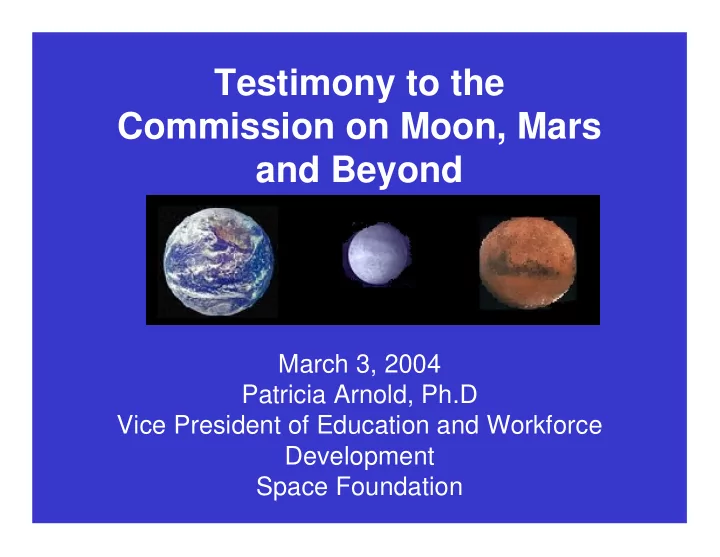

Testimony to the Commission on Moon, Mars and Beyond March 3, 2004 Patricia Arnold, Ph.D Vice President of Education and Workforce Development Space Foundation
The role that NASA and the U.S. Space Exploration plan might play in launching a renaissance in American education Manner in which we do this is critical Annually • India graduates 80,000 • Japan 200,000 • China 800,000 ( Xinhua News Agency, Dec.21, 2002)
NASA cannot be expected to solve all education problems It is much more than providing materials, lesson plans or teaching guides!
The space exploration vision will have profound potential implications for future generations. A need exists to consolidate all NASA education-related activities into a lean and professional “Office of Education Outreach.” Structure of the “Office of Education Outreach”
A significant difference from the existing NASA education program in the new “Office of Education Outreach” would be a small and highly focused Office -- rather than a large department or bureaucracy.
The office serves as an effective liaison with educators and information multiplier organizations such as: • textbook and curriculum providers • media and multi-media companies • regional science centers and museums • educator unions and educator organizations • the network of NASA resource centers
Oversight and guidance to NASA should be provided by a NASA-funded but independent and independently managed national board of advisors .
The job of the Advisory Board is to recommend use of NASA resources through outside suppliers to inspire and support educators and students in STEM (Science, Technology, Engineering, and Math) content proficiency -- and to prepare the next generations for Space Exploration.
Process that the Advisory Board would follow • Meet on a regular basis • Provide guidance to NASA • Autonomous from the Agency and make recommendations to the “Office of Education Outreach”
Examples of recommendations • Clarity of the mission • Strategies for professional procurement, contract management, and project oversight • Promoting a “one NASA” that is focused and efficient
Suggestions for utilizing NASA human resources • Non-bureaucratic way to better support student learning • Assisting with developing the most valuable partnerships in the private sector, non-profits and profit • Collaborations with museums, science centers and libraries .
������������������������������ ������������������������������ ������������������������������ ������������������������������ ������������������ ������������������ ������������������ ������������������ Next step • Develop • Identify • Build
������������������������������������������������ ������������������������������������������������ ������������������������������������������������ ������������������������������������������������ ������������������������������������������������ ������������������������������������������������ ������������������������������������������������ ������������������������������������������������ ����������������������������������������������� ����������������������������������������������� ����������������������������������������������� ����������������������������������������������� ��������������������������������������������� ��������������������������������������������� ��������������������������������������������� ��������������������������������������������� ������������������������������������������� ������������������������������������������� ������������������������������������������� ������������������������������������������� ������������������������������������� ������������������������������������� ������������������������������������� ������������������������������������� ���������������������������������������� ���������������������������������������� ���������������������������������������� ���������������������������������������� ������ ������ ������ ������
Anticipated outcomes derived from the Advisory Board’s recommendations • Insure sequential scope and sequence • Preparing on-going generations • Provide the most valuable human resources • Provide exemplary curriculum • Insure that American children for generations to come are highly qualified and prepared.
Project managers act as support for programs rather than as non-participants, unengaged in the project. They need to oversee professional development programs and Pre-K through 12 curriculums. • Sound pedagogy • Effective teaching strategies • Current research • Advocates for two major areas
The 1999 Third International Mathematics and Science Study (TIMSS) Report 95% of U.S. teachers claimed they were “very aware” or “somewhat aware” of current ideas Developing concepts by proving, deriving, or explaining in some detail is rare for U.S. teachers in comparison to German and Japanese teachers
A crossroads for both space exploration and education. Truly exciting because children love space. Some time since we have had this level of enthusiasm for the space program. Embrace it, share the passion of space exploration with our youngsters, and make sure they receive quality instruction about STEM by exceptionally prepared teachers!
Recommend
More recommend